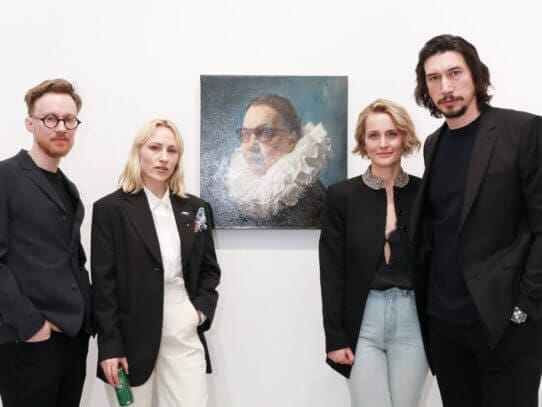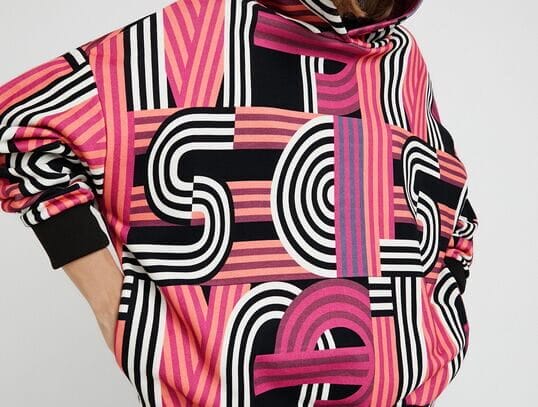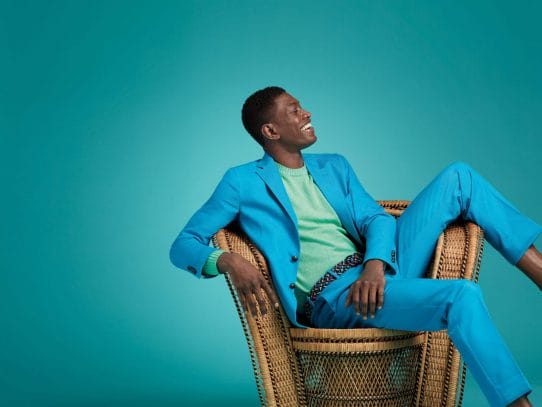Discover Desara, the all-in-one platform revolutionizing the design process. From inspiration to execution, our Research Studio, Mood Boards, Color Palette, and Photo Studio empower creators to innovate effortlessly, validate ideas, and bring concepts to life.
The Intersection of Technology and Fashion: Transforming the Industry
As we move into 2025, the power of data and artificial intelligence (AI) continues to shape the future of retail and fashion industries, creating groundbreaking solutions that redefine how businesses interact with consumers. AI is fueling a monumental transformation in omni-channel retail, enabling companies to digitize every stage of the customer journey, from product to consumer. This evolution not only strengthens operational efficiency but also personalizes customer experiences, driving a shift toward more interactive, adaptable, and sustainable retail.
In the political landscape, President Trump’s return and collaboration with tech innovator Elon Musk are expected to foster an environment ripe for further technological advancements. Businesses and individuals alike should prepare for a new era of innovation, as AI and tech policies create a competitive, forward-thinking economy. With President Trump’s strong support for technological growth, this could be a pivotal period for AI development and its broader application across industries.
President Donald J. Trump and Elon Musk have expressed shared goals to propel the U.S. forward through innovative technology, particularly in fields such as cost reduction, AI, and sustainable energy. Trump has suggested appointing Musk as a “secretary of cost-cutting” to streamline government spending, a position that could align with Musk’s skills in automation and efficiency. This could also yield tax benefits for Musk’s ventures like SpaceX and Tesla, incentivizing further growth in green energy and space exploration initiatives. Musk’s advocacy for AI and free-speech reforms also resonates with Trump’s regulatory agenda, potentially fostering an environment conducive to new tech development and fewer content restrictions on platforms like X (formerly Twitter) source: Newsweek
The story of artificial intelligence began in 1956, when John McCarthy, an American computer scientist, first coined the term “artificial intelligence” at the Dartmouth Conference. Over the years, AI has evolved into a powerful tool, with advancements led by numerous visionaries across the globe. Today, AI’s influence stretches across diverse industries, with a unique and growing impact on fashion and retail. Below, we break down the top ten reasons why AI is essential for fashion and related industries in 2025.
Technology and artificial intelligence (AI) are redefining the fashion and accessories industry, opening up new frontiers of creativity, efficiency, and sustainability. As brands seek to adapt to evolving consumer demands and global trends, the integration of AI-driven tools has become indispensable. Below are 10 reasons why AI is revolutionizing the apparel and accessories industry:
- Enhanced Creativity Through AI-Assisted Design: AI generates curated inspirations, enabling designers to experiment with new styles and techniques.
- Efficiency in Workflow Management: By automating repetitive tasks, AI allows designers to focus more on innovation and less on administration.
- Sustainability Efforts: Virtual sampling and AI-driven production reduce material waste and overproduction.
- Consumer-Centric Customization: AI tailors designs and recommendations based on consumer preferences and data.
- Trend Forecasting: Advanced algorithms analyze market data to predict trends more accurately.
- Cost Savings: Streamlined processes cut costs in prototyping, sampling, and material usage.
- Virtual Try-Ons: Enhanced augmented reality (AR) features help customers visualize products online.
- Supply Chain Optimization: AI tools help manage inventory and logistics with precision.
- Global Collaboration: Cloud-based AI platforms enable seamless collaboration across geographies.
- Photorealistic Visualizations: AI-powered visuals enhance presentations, eliminating the need for physical prototypes.
Streamoid Technologies, founded in is at the forefront of transforming how fashion and lifestyle brands present and manage content. Streamoid’s key offerings include Catalogix, an advanced cataloging platform that facilitates swift, multi-channel listing; Photogenix, an AI-driven photo enhancement tool; and Desara, an upcoming tool for digital fashion design. Streamoid’s solutions cater primarily to the business-to-business (B2B) sector, helping brands enhance operational efficiency and streamline product-to-market processes.
Business Strategy of DESARA
How DESARA’s AI-Powered Platform Empowers Fashion Designers to Stay Ahead in a Competitive Market.
DESARA’s business strategy is rooted in leveraging cutting-edge AI technology to transform the fashion design process, making it more efficient, accessible, and sustainable. The platform targets fashion designers and brands looking to streamline their workflows and reduce reliance on traditional methods, such as physical sampling and fragmented tools. By centralizing key design functions into one AI-powered platform, DESARA creates a seamless experience that fosters creativity and innovation while cutting costs and improving time-to-market efficiency.
At Desara, they aim to empower creativity and innovation through an integrated suite of tools designed to streamline and elevate the design process. The platform is built on four foundational pillars: the Research Studio, a gateway to boundless inspiration; Mood Boards, a space to bring concepts to life with effortless creativity; the Color Palette, an intuitive tool for refining visual harmony; and the Photo Studio, a cutting-edge resource for visualizing and validating designs. Together, these pillars provide a holistic framework that supports every stage of the creative journey, from ideation to market-ready solutions.
Homepage Overview
The Desara homepage serves as a dynamic hub, seamlessly integrating essential tools such as the Research Studio, Mood Boards, Color Palettes, and Photo Studio. This centralized access empowers users to navigate their creative workflows effortlessly.
Research Studio
The Library within the Research Studio is an invaluable resource for sparking inspiration and shaping your creative vision each season. It provides curated links across diverse domains, including art, fashion, music, and architecture. Thoughtfully designed for convenience, the platform allows you to categorize and organize saved searches, share insights via email, and create custom categories, ensuring your sources of inspiration are always accessible and efficiently managed.
Mood Boards
Desara’s Mood Board feature redefines the creative process with its intuitive design. Leveraging diverse templates, a user-friendly drag-and-drop interface, and AI-driven exploration, it simplifies the creation of visually compelling boards. This innovative tool fosters limitless creativity, helping you bring ideas to life and maintain a steady flow of design inspiration.
Photo Studio
The Photo Studio transforms the design and production workflow with photorealistic pre-sample visualization. By enabling early validation of designs and assessing market demand, it bridges the gap between concept and reality. With tools for creating pre-manufacturing e-commerce assets, this feature supports early demand generation and pre-orders. Additionally, the integrated customer personalization engine enhances the shopping experience by offering customization and product visualization options, ensuring a tailored and engaging consumer journey.
A key element of DESARA’s strategy is its focus on adaptability and customization. Recognizing the diversity of design aesthetics and creative needs, DESARA ensures its platform can cater to a broad range of design styles, from high-fashion to mass-market collections. Its approach emphasizes collaboration with early adopters through Beta programs, gathering insights to refine the technology and align it closely with the industry’s demands. This iterative development ensures that DESARA remains at the forefront of fashion tech innovation.
To secure long-term growth, DESARA is pursuing partnerships with fashion houses, independent designers, and educational institutions. These collaborations not only expand DESARA’s user base but also position it as an essential tool for the next generation of designers. By emphasizing sustainability through virtual sampling and AI-optimized production processes, DESARA aligns with the increasing industry and consumer focus on ethical practices, further strengthening its competitive edge.

Technology of DESARA
At the core of DESARA is its AI-powered platform, which integrates machine learning, data analytics, and advanced visualization technologies. The platform automates time-intensive tasks such as trend analysis, moodboard creation, color palette generation, and virtual sampling, allowing designers to focus more on their creative vision. AI algorithms analyze vast datasets to provide curated inspiration and actionable insights, ensuring that designers can make informed decisions throughout the design process.
DESARA’s technology also includes photorealistic visualization capabilities, enabling designers to present lifelike images of their collections without requiring physical prototypes. This feature is a game-changer for reducing costs, time, and environmental impact. The platform’s ability to adapt to individual designer inputs, such as sketches or unique references, makes it highly versatile and user-friendly. Its cloud-based infrastructure ensures seamless collaboration across teams, fostering innovation and connectivity in a globalized industry.
By continuously evolving its AI and machine learning capabilities, DESARA stays ahead of trends and anticipates market needs. Its robust system architecture ensures scalability and reliability, making it suitable for both small design studios and large fashion conglomerates. This technological foundation positions DESARA as a leader in the AI-driven transformation of the fashion industry.
Mission Statement
DESARA’s mission is to revolutionize the fashion industry by empowering designers with innovative AI technology that fosters creativity, enhances efficiency, and promotes sustainability. We are committed to providing tools that streamline the design process, reduce environmental impact, and inspire the next generation of fashion professionals.
Top 5 AI Technologies Transforming the Fashion Industry
- Virtual Sampling Tools (e.g., CLO 3D): Accelerate prototyping and reduce costs.
- Trend Prediction Platforms (e.g., Heuritech): Analyze social media and market data to forecast trends.
- AI-Powered Design Tools (e.g., DESARA): Automate and enhance the design process.
- Retail Analytics Software (e.g., Streamoid): Improve inventory and customer experience.
- Augmented Reality (AR) Applications: Enable virtual try-ons for online shopping.
DESARA Technology
From my perspective, DESARA Technology holds immense promise in redefining the fashion design process. Here are some key strengths and potential challenges of the platform:
Strengths:
- Streamlined Workflow: Centralizes multiple tools into one platform, reducing complexity.
- Enhanced Creativity: Offers curated inspirations and photorealistic visualizations to push creative boundaries.
- Sustainability: Reduces waste through virtual sampling.
- Customization: Adapts to a wide range of aesthetic styles and creative inputs.
- Cost-Efficiency: Minimizes the need for physical prototypes.
Challenges:
- Adoption Curve: Convincing traditional designers to transition to AI-based tools.
- Customization Limits: While highly adaptable, it may face challenges with extremely niche or avant-garde styles.
- Cost of Implementation: Initial investment may deter smaller brands.
- Data Privacy: Ensuring secure management of proprietary designs and data.
- AI Dependency: Balancing human creativity with machine learning outputs.
Interview with Suna Hasan, Founder of DESARA Technology

Joseph DeAcetis: Can you explain how DESARA technology works and what its primary purpose is in enhancing the creative process for fashion designers?
Suna Hasan: DESARA is an AI-powered platform designed to streamline and enhance the entire fashion design process. It centralizes key design functions like research, moodboards, color palettes, and visualization into a single tool. Using AI, DESARA automates repetitive tasks, provides curated inspiration, and offers photorealistic visualizations, allowing designers to focus more on creativity and innovation. Its primary purpose is to make the design process faster, smarter, and more efficient.
Joseph DeAcetis: What specific challenges in fashion design does DESARA address, and how does it streamline designers’ workflows?
Suna Hasan: DESARA addresses several challenges, including time-intensive research, costly physical sampling, and fragmented workflows. By centralizing resources and leveraging AI, it reduces the need for multiple tools, automates color and print generation, and offers virtual sampling to minimize reliance on physical prototypes. This enables designers to quickly conceptualize, refine, and present their ideas with ease, saving both time and resources.

Joseph DeAcetis: How does DESARA integrate AI or machine learning to assist designers in conceptualizing and finalizing collections?
Suna Hasan: DESARA uses AI and machine learning to analyze and generate insights from vast datasets, offering curated inspirations and trend analysis. For conceptualizing collections, it provides tools like AI-assisted color extraction, pattern generation, and image refinement. For finalizing collections, its photorealistic visualization capabilities ensure designs are presented accurately, helping designers and buyers make informed decisions without needing physical samples.
Joseph DeAcetis: Can DESARA adapt to different design aesthetics and creative styles, and if so, how does it achieve this level of customization?
Suna Hasan: Yes, DESARA is highly adaptable to diverse design aesthetics and styles. Designers can input their unique inspirations, sketches, and references, and DESARA’s AI customizes outputs based on these inputs. Its extensive libraries and adjustable templates also allow for the creation of highly personalized moodboards, color palettes, and visuals that align with individual creative visions.
Joseph DeAcetis: What feedback have designers provided about DESARA? Can you share any success stories or notable collaborations involving this tool?
Suna Hasan: We are working with early Beta customers who are beginning to integrate DESARA into specific areas of their design process. They are productizing and transitioning parts of their current workflows to this platform, and they are already seeing significant, transformative benefits in terms of efficiency and creativity.
A Bright Future for DESARA
As we step into a data-driven future, the fashion industry stands to benefit immensely from AI-powered solutions that enhance operational efficiency and elevate customer experiences. The transformation toward seamless omni-channel retail is poised to reshape the landscape, creating exciting opportunities for brands and consumers alike.
As the fashion industry evolves, platforms like DESARA will play a pivotal role in shaping the future of design and production. By leveraging AI and machine learning, DESARA empowers designers to be more creative and efficient while addressing sustainability concerns. Though challenges like adoption and cost remain, the transformative potential of this tool far outweighs its hurdles.
With its innovative approach, DESARA is not just a tool—it is a glimpse into the future of fashion technology.
About the Author:
Joseph DeAcetis is a visionary force in the world of fashion, celebrated as one of the finest wardrobe stylists and art directors of his generation. His expertise and creativity have earned him accolades throughout the industry, placing him at the forefront of fashion’s evolution. Joseph’s work seamlessly weaves together style, culture, art, and fashion, with a special focus on the shifting landscape of menswear.
Over the course of his distinguished career, Joseph has had the privilege of styling and even interviewing global icons such as Elon Musk, Justin Bieber, Richard Branson, Katy Perry, Tom Brady, and A$AP Rocky, to name just a few. His influence extends beyond styling, as he has also been a prolific writer, contributing award-winning columns to esteemed publications like Esquire, People Magazine, Robb Report, and Playboy. His deep insights and captivating storytelling have established him as a leading voice in fashion journalism.
Joseph most recently served as Creative Fashion Director at Forbes Media, where his dual role as critic and reporter allowed him to explore the intersection of technology and fashion, always championing the transformative power of style. As the founder and president of POTRO, the premier Latinx menswear brand, Joseph is redefining modern menswear with a commitment to celebrating Latinx heritage and craftsmanship.
With an authoritative yet relatable voice, Joseph DeAcetis continues to inspire and influence the world of fashion, setting new standards for success and innovation.
Comments, questions, or feedback? visit me at stylelujo.com
Save Article










